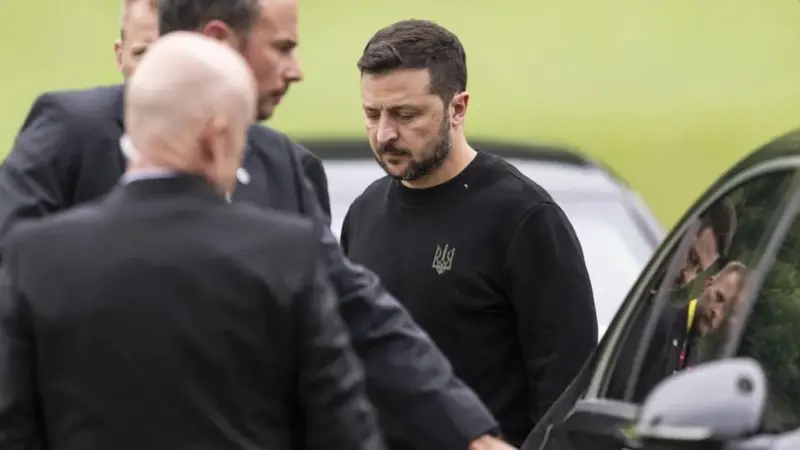
The peace summit in Switzerland that will discuss ways out of the War in Ukraine
During this weekend, a Swiss resort located near Lake Lucerne will be transformed with the arrival of dozens of world leaders, as well as thousands of soldiers and police.
More than 90 countries and global institutions participate in the event, which aims to discuss the basic principles for ending the war in Ukraine.
The Swiss hope the summit can produce the first sketches of a peace process, some 28 months after Russia invaded the neighboring country.
It is the largest meeting on the subject since the start of the large-scale attack.
The event is marked by the departure of important actors in this process, such as China. Furthermore, Russian President Vladimir Putin recently issued a new ultimatum — demanding Ukraine’s capitulation — and expectations of any concrete progress are low.
Russia was not invited to the summit.
For Ukraine, the mere fact that this meeting took place is already positive.
Politicians in Kiev have welcomed each confirmed participant as a gesture of support.
For them, a meeting of this size could demonstrate to Russia that the world is on Ukraine’s side — and international law.
The summit in Switzerland comes at a difficult time.
Recent weeks have been marked by a new Russian offensive in the northeast, near Kharkiv. Missiles hit homes and power plants across Ukraine with renewed intensity.
Therefore, at an event of this type, the number of confirmed guests matters — as does the outcome of what is discussed.
“It is important to establish a political and legal framework for future peace. It will also be necessary to show that this peace can only be achieved based on the ten-point plan established by Zelensky”, analyzes Ukrainian deputy Oleksandr Merezhko.
“This includes Ukraine’s territorial integrity and the country’s sovereignty,” he adds.
The politician refers to a peace plan presented at the end of 2022 by the president of Ukraine, which insists on obliging Russia to return all land occupied during the invasion.
Ukraine now wants to bring together as many countries as possible around this demand, putting “psychological pressure” on Russia so that the country accepts such terms, if it reaches that stage.
At the moment, this scenario seems unlikely.
Holding a summit was first discussed when the situation on the battlefield looked most promising for Kiev: a prime time to try to define the terms of any future peace agreement.
Since then, the dynamics of the war have changed.
“I sense a growing feeling that the war cannot be won by Ukraine,” argues Sam Greene, from the Center for European Policy Analysis (CEPA).
The expert points to a “significant portion” of the US foreign policy group that believes Ukraine should “reduce its losses”.
He also notes that there is increasing support in Europe for right-wing parties that are more sympathetic to Russia.
“I think one thing this event aims to do is revive support for Ukraine’s view that there is an acceptable way out,” says Greene.
But the participation of senior figures at the summit is less promising than Ukraine and Switzerland initially expected.
Joe Biden will not appear in person, a decision that upset Zelensky.
Attempts to enlist the adhesion of key countries in the “Global South”—which are not instinctive allies of Ukraine—have only been partially successful.
India, Brazil and China will not attend, or will only send low-level representatives.
Russian authorities have reinforced that they consider the event insignificant. Russian Foreign Minister Sergei Lavrov called the summit “useless” and “insignificant”. Even so, Moscow has pressured allies to boycott the event.
“It appears that China has decided to support its strategic partner, Russia, without limits, and not the peace process. They support the aggressor, not peace”, laments Oleksandr Merezhko.
On the eve of the event, Vladimir Putin tried to throw another obstacle by defining his own conditions for a supposed peace process: he wants Ukraine to capitulate.
Among other things, Putin demands that Ukraine hand over all four regions that Russia claims to have annexed, including areas that remain under the control of the Kiev government.
Ukraine called the Russian demands “ridiculous.”
The meeting in Lake Lucerne, Switzerland, will address three of the least controversial points of Zelensky’s peace formula: the issues of nuclear safety, the shipment of food to global markets and the handover of Ukrainian children and prisoners who have been captured.
Advancing beyond these points is unlikely to be productive—not now, nor when Ukraine and Russia are ready to give up the fight.
“I think from the Ukrainian perspective, when you look at what’s going on on the front lines, what they really need is not a commitment to peace, certainly not at any cost,” argues Sam Greene, referring to the paper of Kiev’s allies.
“They need a commitment to win the war,” he concludes.
With information from the BBC.
Source: https://www.ocafezinho.com/2024/06/15/armadilha-da-otan-na-suica-comeca-com-climao-pesado-de-derrota/

